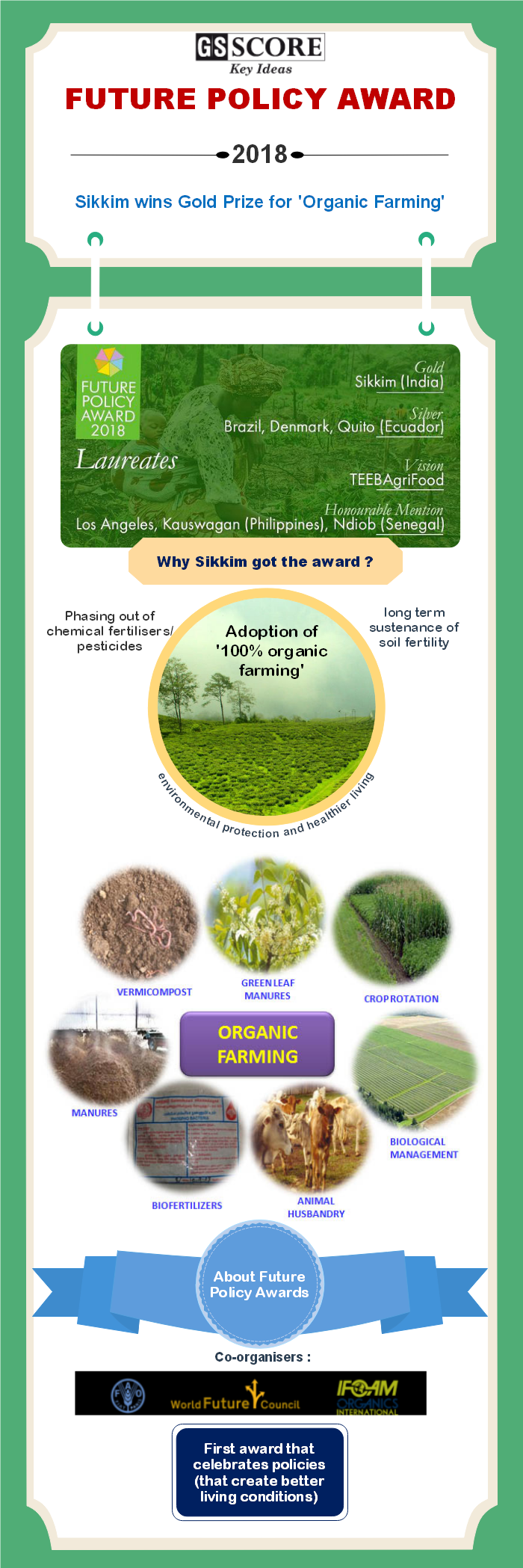

Sikkim has been awarded the prestigious gold prize at global Future Policy Awards for promoting agro-ecology through policies and laws that have made it a "100 per cent organic farming" state.
Context
Sikkim has been awarded the prestigious gold prize at global Future Policy Awards for promoting agro-ecology through policies and laws that have made it a "100 per cent organic farming" state.
About
- Sikkim is 2018's winner of the "Oscar for best policies", beating 51 nominated policies from 25 countries.
- The award is co-organised by the Food and Agriculture Organisation (FAO), the World Future Council (WFC) and IFOAM Organics International.
- Policies from Brazil, Denmark and Quito(Ecuador) were awarded silver prize.
- According to the organizers, Sikkim’s policies implemented a phase out of chemical fertilisers and pesticides, and achieved a total ban on sale and use of chemical pesticides in the state. The transition has benefited more than 66,000 farming families.
Future Policy Award:
- The award celebrates policies that create better living conditions for current and future generations.
- It aims to raise global awareness for exemplary policies and speed up policy action.
- It is the first award that celebrates policies rather than people on an international level.
- Each year, award identifies one issue on which policy progress is particularly urgent.
Sikkim Organic Mission:
- Sikkim Chief Minister Pawan Chamling, who as Founder-President of the Sikkim Democratic Front has been ruling the state for a record 25 years now.
- The Government of Sikkim stepped into Organic Mission with officially announcement of adoption of organic farming in 2003. Same year, it stopped imports of chemical fertilizers in the State.
- The process for bringing the total cultivatable land of 58,168 hectares under organic farming commenced at ground levels from 2010. Agencies accredited by Agriculture and Processed Food Products Export Development Authority are certifying the organic process in Sikkim in three phases.
- Today, the entire farmland has been certified as organic land. The state has been lauded for transcending boundaries of cultivation and embedding in its design socioeconomic aspects such as consumption and market expansion, and cultural aspects as well as health, education, rural development and sustainable tourism.
- The hundred per cent transition has benefited more than 66,000 farming families and the state’s tourism has grown by 50 per cent between 2014 and 2017.
- Organic farming not only ensured long-term sustenance of soil fertility in the state but also contributed in the protection of environment and ecology. It also promoted healthy living.
- Sikkim, however, had to struggle a lot initially during its transition phase when the government banned the consumption of non-organic agricultural and horticultural items. Soon, a boost in organic farming helped in dealing with the shortage of vegetables in the state.
Organic Farming:
Organic production is a holistic system designed to optimize the productivity and fitness of diverse communities within the agro-ecosystem, including soil organisms, plants, livestock and people. The principal goal of organic production is to develop enterprises that are sustainable and harmonious with the environment.
Benefits of organic farming:
- Maintains long-term soil fertility by optimizing conditions for biological activity within the soil.
- Recycle materials and resources to the greatest extent possible within the enterprise.
- Provide attentive care that promotes the health and meets the behavioural needs of livestock.
- Rely on renewable resources in locally organized agricultural systems.
- Maintains biological diversity within the system.
Food and Agriculture Organization:
- FAO is a specialized agency of the United Nations that leads international efforts to defeat hunger.
- Serving both developed and developing countries, FAO acts as a neutral forum where all nations meet as equals to negotiate arguments and debate policy.
- FAO is also a source of knowledge and information, and helps developing countries in transition to modernize and improve agriculture, forestry and fisheries practices, ensuring good nutrition and food security for all.
Significance
- A transition to sustainable food and agriculture systems is critical to achieving sustainable development, and the 2018 Future Policy Award is unique as it highlights policies that advance such a transition.
- With its policies and current recognition, Sikkim sets an excellent example of how other Indian states and countries worldwide can successfully upscale agro-ecology.
Learning Aid



